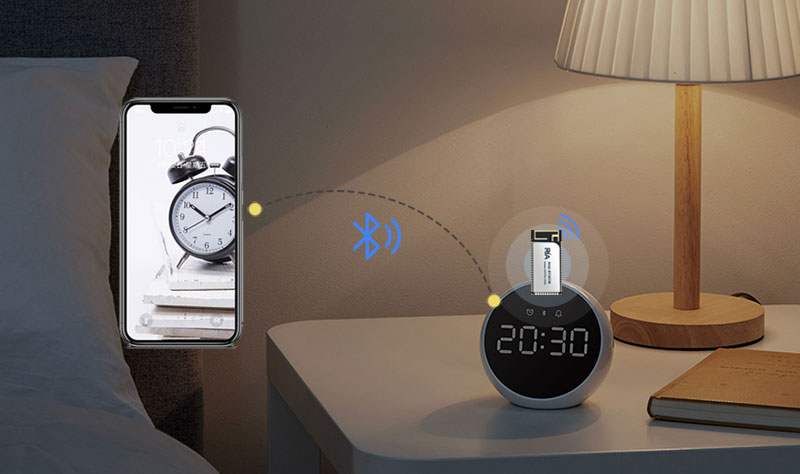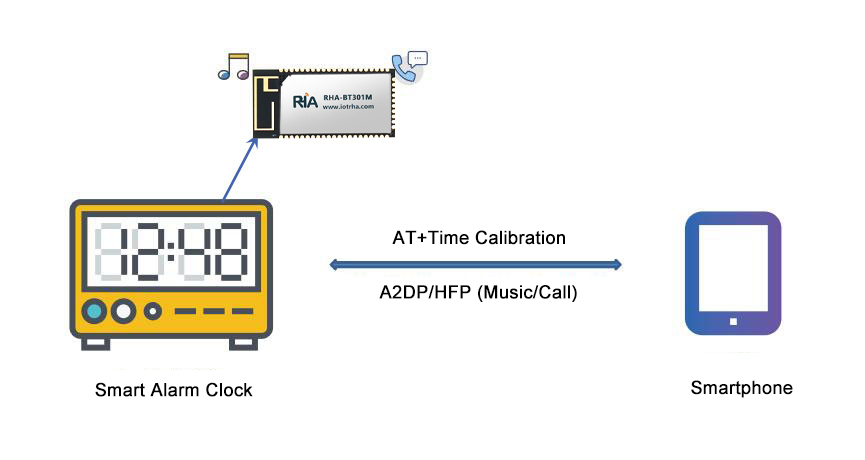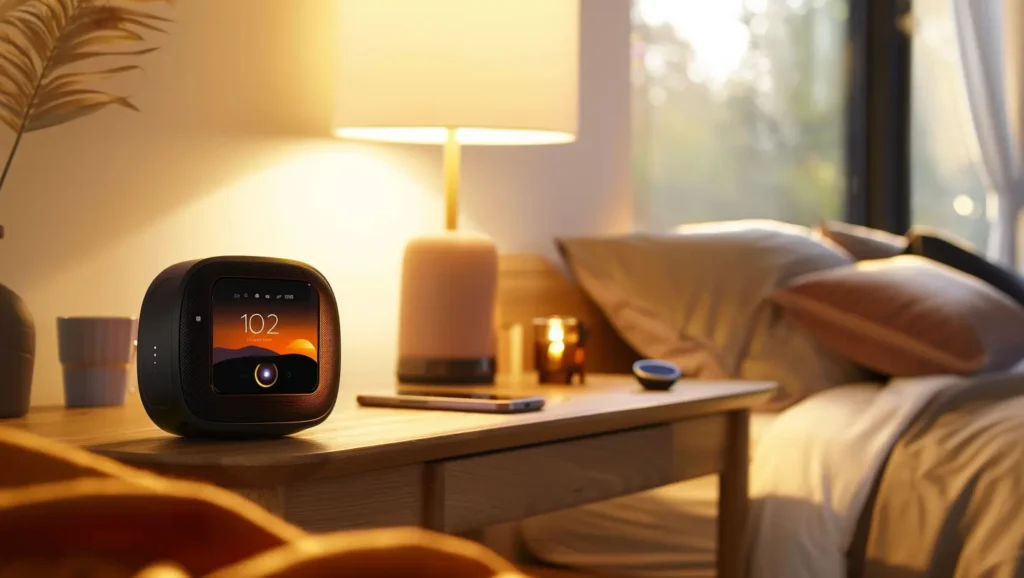
Have you ever wondered how a simple alarm clock could transform into a smart, versatile assistant that enriches your mornings? With the integration of Bluetooth audio modules, the traditional alarm clock evolves into a high-tech device offering advanced features like high-quality audio, personalized alarms, and even voice control.
Bluetooth audio modules empower smart alarm clocks to deliver wireless audio streaming, voice assistant integration, and customizable wake-up experiences. These innovations turn a basic clock into a multifunctional device that enhances your lifestyle.
I used to think alarm clocks were just for waking up—until I got one with a Bluetooth audio module. Suddenly, it became my morning assistant, playing my favorite music, giving weather updates, and even managing reminders. It’s amazing how one device can do so much more.
Smart alarms have evolved far beyond basic wake-up calls. They now require high-quality audio output, stable connectivity, and extended battery life. These essential features rely on the performance of the Bluetooth audio module.
Audio quality is the foundation of a user’s experience. A Bluetooth audio module must support advanced audio codecs to ensure crystal-clear sound with minimal delay.
Our technical team integrates bluetooth audio modules(RHA-BT301M) supporting AAC and SBC audio codecs, which deliver high-fidelity audio. Additionally, low-latency capabilities ensure synchronized playback for alarms and music, eliminating timing errors that might disrupt the user experience.

Reliable connectivity is a key requirement for Bluetooth-enabled smart alarms. Users should enjoy uninterrupted audio regardless of their location within a standard household.
By leveraging advanced Bluetooth modules, our team ensures improved data transmission reliability and range, allowing seamless audio playback within 10-15 meters. Multi-device pairing capabilities also enable users to switch devices effortlessly without re-pairing.
Extended battery life is crucial for smart alarms, as users expect long operational hours without frequent recharging. Bluetooth audio modules must prioritize power efficiency to meet this demand.
Our team incorporates Bluetooth Low Energy (BLE) technology into the modules, which significantly reduces power consumption. This optimization has been shown to improve battery life by 30% or more under standard use conditions, effectively addressing the challenge of frequent recharging.
| Core Feature | Technical Advantage | User Benefit |
|---|---|---|
| Audio Quality and Experience | AAC/SBC high-fidelity audio codecs | Clear, high-quality sound output |
| Connection Stability and Range | Reliable connectivity, 10-15m range | Stable connections, no dropouts |
| Low Power Consumption | BLE technology for power efficiency | 30% longer battery life |
Advanced Bluetooth modules support stable connectivity within a range of up to 15 meters indoors. True
Bluetooth modules are optimized for mid-range indoor environments, ensuring reliable connections up to 15 meters.
Bluetooth modules can guarantee stable connections across any distance in all environments. False
Connection stability depends on environmental factors such as walls, interference, and module specifications.
Bluetooth modules are at the heart of modern smart alarm innovations. They enable features like voice assistant integration, multi-device connectivity, customized audio playback, and compatibility with smart home ecosystems.
Voice assistant integration allows users to control their smart alarms hands-free. Whether setting alarms, playing music, or adjusting settings, voice commands provide unmatched convenience.
Our technical team developed the Bluetooth 5.0 audio module, ensuring seamless integration with popular voice assistants like Amazon Alexa and Google Assistant, making it easy for users to interact with their alarms using simple voice instructions.

The ability to connect to multiple devices enhances the alarm’s versatility. Users can link their smart alarm to phones, tablets, or even smart speakers, enabling effortless switching and control.
Our Bluetooth modules support simultaneous connections, allowing users to stream audio from one device while keeping another device paired for quick use.
Personalization is key to modern smart alarms. Users can customize wake-up tones, playlists, or even spoken reminders for a personalized experience.
Our team developed alarms with Bluetooth-enabled custom audio playback, letting users upload their favorite tracks or select from pre-set soundscapes to create a tailored wake-up experience.
Compatibility with other smart home devices enhances the alarm’s functionality. From syncing lights with alarms to controlling thermostats, integration creates a seamless smart home experience.
| Feature | Technical Advantage | User Benefit |
|---|---|---|
| Integration with Voice Assistants | Works with Alexa and Google Assistant | Hands-free control of alarms and music |
| Multi-Device Connectivity | Supports simultaneous Bluetooth connections | Effortless device switching |
| Customized Audio Playback | Bluetooth-enabled custom soundscapes | Personalized wake-up tones and playlists |
| Smart Home Compatibility | Compatible with Zigbee and Z-Wave protocols | Seamless integration into smart homes |
When selecting a Bluetooth module for smart alarms, I’ve learned from experience that it’s not just about technical specifications—it’s about finding a solution that balances performance, cost, and reliability. From Bluetooth version to latency control, every feature has a direct impact on the user experience and product success.
Here’s a table summarizing the key parameters and considerations that I’ve found critical during our Bluetooth module evaluations:
| Feature | Key Considerations |
|---|---|
| Bluetooth Version | Higher versions (e.g., Bluetooth 5.0) offer better speed, range, and energy efficiency. |
| Latency Control | In one project, reducing latency ensured alarms and music playback stayed perfectly synchronized. |
| Cost and Price Factors | Balancing module costs with competitive pricing has been a key challenge in smart device development. |
| Interference Resistance | Robust performance in environments with high wireless interference is critical—especially in urban areas. |
| Temperature and Humidity Adaptability | Once, a project failed due to poor module performance in high-humidity environments, underscoring the importance of adaptability. |
| Lifecycle and Maintenance | Selecting long-lasting, low-maintenance modules reduces overall production and support costs. |
| Customization Support | For custom alarms, I’ve found that flexibility in firmware and software is essential for innovation. |
| After-Sales and Technical Support | Timely support saved us weeks during the integration phase of a recent project. |
From personal experience, ignoring parameters like interference resistance or environmental adaptability can lead to costly delays and product failures. A thorough evaluation process and hands-on testing are critical to finding the perfect Bluetooth module. Each choice has lasting consequences for the final product, from reliability to user satisfaction.
Customizable Bluetooth modules allow developers to tailor features to meet the unique needs of smart alarms. True
Flexible firmware and software options enable developers to optimize modules for specific project requirements.
All Bluetooth modules offer the same level of flexibility for firmware or feature customization. False
Not all modules support custom firmware or advanced feature adjustments, limiting development options.
From my experience with smart alarm projects, understanding user needs and delivering multi-functional features is essential. Smart alarms now act as wireless speakers, voice assistants, and communication hubs, far beyond simple wake-up tools.

In my work, I’ve come across three key types of users who rely on Bluetooth-enabled smart alarms:
From a development perspective, creating competitive smart alarms means focusing on multi-functionality and efficiency. I’ve found that successful products often excel in:
One thing I’ve learned is that manufacturers and developers value Bluetooth modules that are flexible and easy to integrate. During a custom smart alarm project, we worked with Bluetooth modules that supported firmware adjustments, allowing us to:
| Feature | Key Application | User Value |
|---|---|---|
| Wireless Audio Alarms | Bluetooth streaming for music and alarms | Better audio experience for daily use |
| Voice-Controlled Alarms | Integration with Alexa or Google Assistant | Hands-free convenience |
| Hands-Free Calling | Bluetooth-enabled call functionality | Easy communication without extra devices |
| Customization and Integration | Flexible firmware for tailored features | Accelerates development and meets user needs |
From my experience, success in smart alarm development comes from understanding user priorities and aligning them with technology. Features like high-quality audio, seamless voice control, and reliable hands-free calling address real-world needs and drive market impact.

As smart alarms continue to evolve, the future lies in technology integration and intelligent interaction. Combining Bluetooth with advanced technologies like Wi-Fi, mesh networks, and AI can unlock new possibilities, driving greater functionality and user satisfaction.
In my experience, the integration of Bluetooth with complementary technologies such as Wi-Fi or mesh networks has been a game-changer. Users increasingly expect seamless connectivity that extends beyond single-device functionality. For example:
The rise of AI is transforming how users interact with their devices, and smart alarms are no exception. In one recent project, we explored integrating AI-generated voice responses into Bluetooth modules, enabling dynamic interactions like:
| Trend | Key Benefits |
|---|---|
| Bluetooth + Wi-Fi | Enables faster streaming, broader range, and compatibility with other smart devices. |
| Mesh Networking | Creates seamless multi-room control and synchronization for connected alarms. |
| AI-Enhanced Interaction | Allows for smarter voice control and personalized audio content delivery. |
The future of smart alarms lies in the fusion of Bluetooth with complementary technologies and intelligent AI interactions. From hybrid connectivity to smarter audio responses, these advancements will redefine the capabilities of Bluetooth-enabled devices, ensuring they remain at the forefront of smart home innovation.
Bluetooth audio modules play a crucial role in shaping the performance and functionality of smart alarms. Users prioritize key features such as high-quality audio, stable connectivity, low power consumption, and innovative capabilities. Additionally, they seek differentiation through features like voice interaction, customizable audio settings, and seamless integration with smart home ecosystems.
To stay competitive, manufacturers must focus on these user demands while leveraging advanced technologies, such as AI-powered audio interactions and Bluetooth integration with Wi-Fi or mesh networks, to deliver smarter, more personalized, and future-ready smart alarms.
Are you ready to take your smart alarm to the next level with advanced Bluetooth features? We recommend trying our RHA-BT301M Bluetooth 5.0 audio module, designed to deliver high-quality audio, stable connectivity, and low power consumption for a smarter, more competitive product. Learn more about RHA-BT301M here.
